A group of approximately twenty foreign exchange students from Seoul National University (SNU) traveled to the city of Andong, located in North Gyeongsang Province in eastern South Korea November 1-3. The three-day trip was organized by the SNU Office of Student Affairs for the purpose of giving foreign students an opportunity to experience the traditions of Korea.
On the first day of the trip the students arrived in Andong and settled in the Korean Studies Advancement Center. The trip began with a lecture that spoke of the unique characteristics of Korean culture. The lecture highlighted the prestige of scholars characteristic of Korean society, especially those featured on the currently circulating Korean banknotes. The lecture also touched on more recent topics such as Psy’s ‘Gangnam Style’ phenomenon.
Following the lecture, the students went to a museum that held many relics and artifacts from the Confucian culture of Korea. At the end of the museum tour the students were able to experience traditional forms of printing, using black ink, brushes and stamp-like impressions.
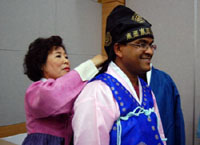 To end the first day, students received a lesson in the traditional etiquette of Korea. Wearing traditional Korean dress, hanbok, students learned to bow with grace and respect. The foreign students looked a bit uncomfortable at the beginning of the lesson, not used to the silk dressing. But after the lesson, everyone had cheerful expressions, bowing to each other in the traditional Korean way.
To end the first day, students received a lesson in the traditional etiquette of Korea. Wearing traditional Korean dress, hanbok, students learned to bow with grace and respect. The foreign students looked a bit uncomfortable at the beginning of the lesson, not used to the silk dressing. But after the lesson, everyone had cheerful expressions, bowing to each other in the traditional Korean way.
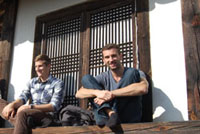 After a hearty breakfast, the second day began early in the morning. Students moved to Hahoe Folk Village, a traditional village from the Joseon Dynasty. This particular village is valuable because it preserves not only the Joseon period-style architecture but also folk traditions and treasured books. Standing in the soft-brown traditional houses, the students looked out of place. The trees with plump persimmons hanging like light bulbs and the ginkgo leaves that fluttered through the air were entrancing.
After a hearty breakfast, the second day began early in the morning. Students moved to Hahoe Folk Village, a traditional village from the Joseon Dynasty. This particular village is valuable because it preserves not only the Joseon period-style architecture but also folk traditions and treasured books. Standing in the soft-brown traditional houses, the students looked out of place. The trees with plump persimmons hanging like light bulbs and the ginkgo leaves that fluttered through the air were entrancing.
After meandering through the folk village, students had a traditional Andong-style lunch that consisted of salted mackerel, heotjesabap (a variety of bibimbap that is served with soy sauce instead of the hot pepper paste), Andong sikhye, namul (various types of vegetables) and jeon (Korean pancakes).
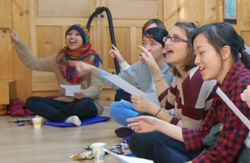 Following the meal, students settled in their new home for the night, Gunja Village, a historic site that consists of centuries-old buildings of the Yean clan. The warm ondol floor was a comfortable seat for the next activity: traditional Korean kugak music. Listening to various instruments such as the Korean flute (piri) and the Korean zither-like string instrument (gayageum), the students learned to sing the iconic Arirang.
Following the meal, students settled in their new home for the night, Gunja Village, a historic site that consists of centuries-old buildings of the Yean clan. The warm ondol floor was a comfortable seat for the next activity: traditional Korean kugak music. Listening to various instruments such as the Korean flute (piri) and the Korean zither-like string instrument (gayageum), the students learned to sing the iconic Arirang.
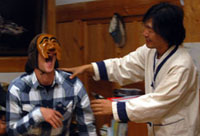 Following the music lessons were mask dance lessons during which the students made a circle and danced around the room wearing handmade traditional Korean masks. Soon the sky darkened and enveloped the surroundings, with the boastful stars that are only visible in the countryside.
Following the music lessons were mask dance lessons during which the students made a circle and danced around the room wearing handmade traditional Korean masks. Soon the sky darkened and enveloped the surroundings, with the boastful stars that are only visible in the countryside.
The last day of the trip consisted of a visit to Dosan Seowon, a private Korean Confucian academy where the renowned scholar Yi Hwang retired in 1549. The complex consists of a lecture hall, a dormitory for students and a square lotus pond. Located deep in the mountains, the academy was surrounded by the lush trees which provided a serene atmosphere.
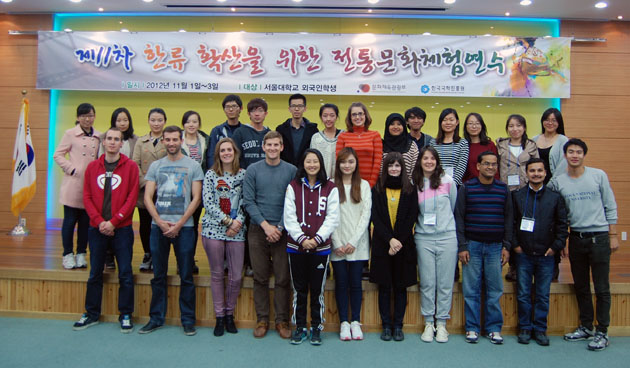
Christian Zischler (Germany, College of Business Administration) expressed,"As an exchange student, SISA’s trip to Andong has substantially contributed to my overall experience in Korea. Indulging in the Korean culture by wearing traditional clothes and singing folk songs as well as witnessing Andong’s beautiful villages and World Heritage has shaped the way I view this country and largely influenced how I will remember my time in Korea. Having had the possibility to spend this time with a very diverse student group further enhanced my global mindset."
The SNU Office of Student Affairs typically offers a culture trip every semester.
Written by OH Jung Eun, SNU English Editor, josefinaoh@snu.ac.kr
Reviewed by Eli Park Sorensen, SNU Professor of Liberal Studies, eps7257@snu.ac.kr
Proofread by Brett Johnson, SNU English Editor, morningcalm2@gmail.com

